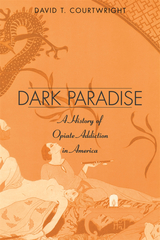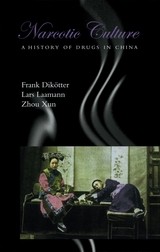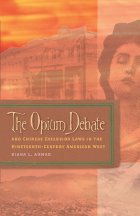
In a newly enlarged edition of this eye-opening book, David T. Courtwright offers an original interpretation of a puzzling chapter in American social and medical history: the dramatic change in the pattern of opiate addiction--from respectable upper-class matrons to lower-class urban males, often with a criminal record. Challenging the prevailing view that the shift resulted from harsh new laws, Courtwright shows that the crucial role was played by the medical rather than the legal profession.
Dark Paradise tells the story not only from the standpoint of legal and medical sources, but also from the perspective of addicts themselves. With the addition of a new introduction and two new chapters on heroin addiction and treatment since 1940, Courtwright has updated this compelling work of social history for the present crisis of the Drug War.

In a stunning historical reversal, Frank Dikötter, Lars Laamann, and Zhou Xun tell this different story of the relationship between opium and the Chinese. They reveal that opium actually had few harmful effects on either health or longevity; in fact, it was prepared and appreciated in highly complex rituals with inbuilt constraints preventing excessive use. Opium was even used as a medicinal panacea in China before the availability of aspirin and penicillin. But as a result of the British effort to eradicate opium, the Chinese turned from the relatively benign use of that drug to heroin, morphine, cocaine, and countless other psychoactive substances. Narcotic Culture provides abundant evidence that the transition from a tolerated opium culture to a system of prohibition produced a "cure" that was far worse than the disease.
Delving into a history of drugs and their abuses, Narcotic Culture is part revisionist history of imperial and twentieth-century Britain and part sobering portrait of the dangers of prohibition.

America’s current "war on drugs" is not the nation’s first. In the mid-nineteenth century, opium-smoking was decried as a major social and public health problem, especially in the West. Although China faced its own epidemic of opium addiction, only a very small minority of Chinese immigrants in America were actually involved in the opium business. It was in Anglo communities that the use of opium soon spread and this growing use was deemed a threat to the nation’s entrepreneurial spirit and to its growing mportance as a world economic and military power. The Opium Debate examines how the spread of opium-smoking fueled racism and created demands for the removal of the Chinese from American life. This meticulously researched study of the nineteenth-century drug-abuse crisis reveals the ways moral crusaders linked their antiopium rhetoric to already active demands for Chinese exclusion. Until this time, anti-Chinese propaganda had been dominated by protests against the economic and political impact of Chinese workers and the alleged role of Chinese women as prostitutes. The use of the drug by Anglos added another reason for demonizing Chinese immigrants. Ahmad describes the disparities between Anglo-American perceptions of Chinese immigrants and the somber realities of these people’s lives, especially the role that opium-smoking came to play in the Anglo-American community, mostly among middle- and upper-class women. The book offers a brilliant analysis of the evolution of the Chinese Exclusion Act of 1882, plus important insights into the social history of the nineteenth-century West, the culture of American Victorianism, and the rhetoric of racism in American politics.

In 1908, a very public crusade against opium was in full swing throughout China, and the provincial capital and treaty port of Fuzhou was a central stage for the campaign. This, the most successful attempt undertaken by the Chinese state before 1949 to eliminate opium, came at a time when, according to many historians, China’s central state was virtually powerless. This volume attempts to reconcile that apparent contradiction.
The remarkable, albeit temporary, success of the anti-opium campaign between 1906 and 1920 is as yet largely unexplained. How these results were achieved, how that progress was squandered, and why China’s opium problem proved so tenacious are the questions that inspired this volume. The attack on this social problem was led by China’s central and provincial authorities, aided by reformist elites, and seemingly supported by most Chinese. The anti-opium movement relied on the control and oversight provided by a multilayered state bureaucracy, the activism and support of unofficial elite-led reform groups, the broad nationalistic and humanitarian appeal of the campaign, and the cooperation of the British government. The extent to which the Chinese state was able to control the pace and direction of the anti-opium campaign and the evolving nature of the political space in which elite reformers publicized and enforced that campaign are the guiding themes of this analysis.
READERS
Browse our collection.
PUBLISHERS
See BiblioVault's publisher services.
STUDENT SERVICES
Files for college accessibility offices.
UChicago Accessibility Resources
home | accessibility | search | about | contact us
BiblioVault ® 2001 - 2024
The University of Chicago Press









